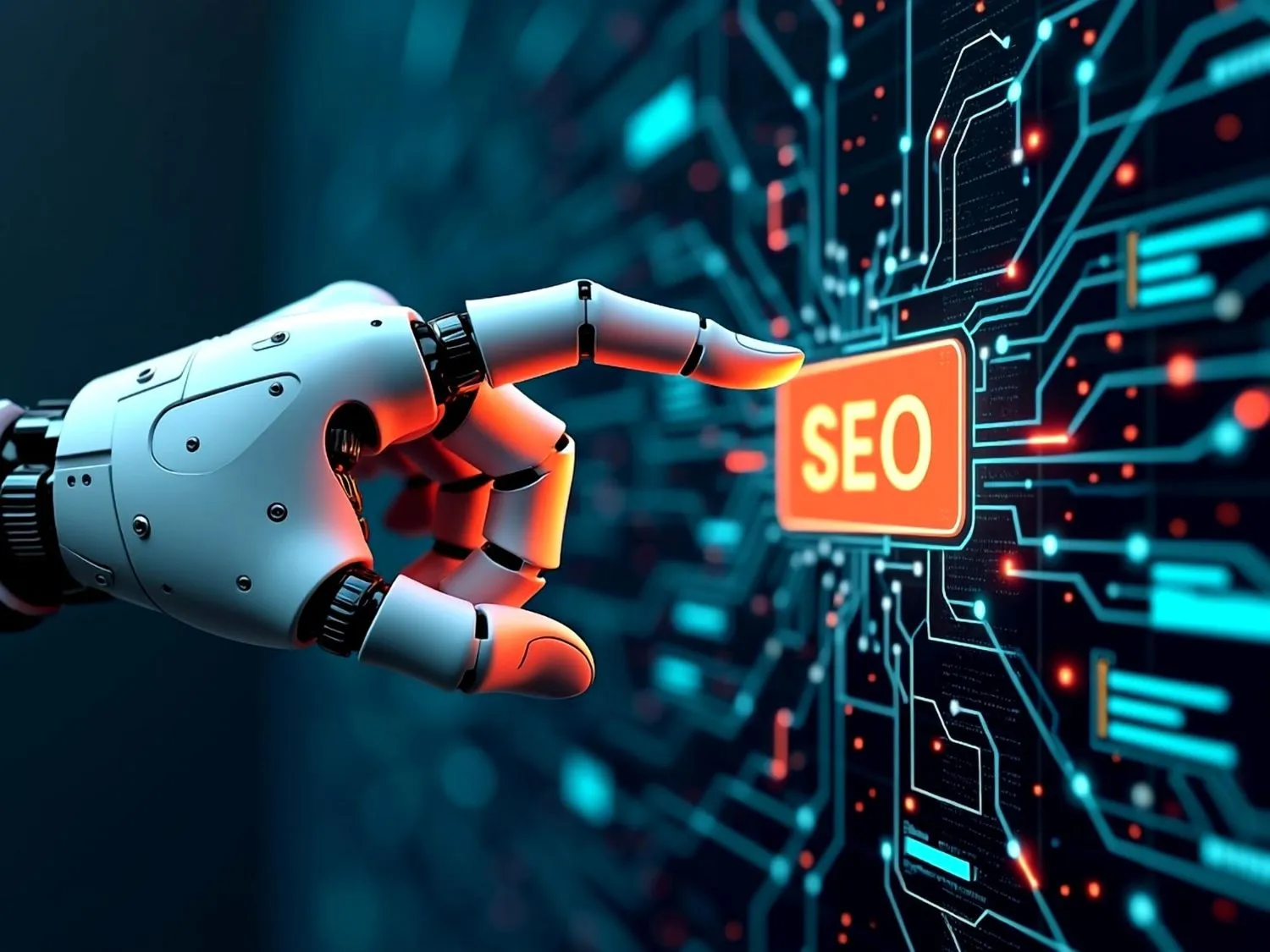Artificial Intelligence (AI) helps build topical authority by supporting keyword analysis, generating content fragments, optimizing the internal structure of the site, analyzing competitor sites, and monitoring and analyzing site performance.
What is topical authority and why is it important in SEO?
Topical authority is a measure of how well a website is perceived as a source of reliable and valuable information on a given topic. It is important in SEO because sites with high authority are considered experts in their field, providing users with comprehensive, up-to-date, and reliable content.

Imagine two websites dedicated to healthy eating. The first page regularly publishes articles written by registered dietitians, with research-backed advice and recipes. The second page, on the other hand, contains mostly sponsored content and does not cite credible sources. In this case, the first page would have higher topical authority on the topic of healthy eating.
The Role of Topical Authority in SEO
Topical authority plays a significant role in SEO because search engines strive to provide users with the best and most relevant results. Pages with high topical authority are perceived as more valuable and trustworthy, which translates into higher rankings in search results.
When a user searches for information on “how to care for houseplants,” search engines are likely to rank high on sites that regularly publish reliable and comprehensive advice on the subject, written by gardening experts. Pages with lower topical authority, with superficial or unreliable information, will rank lower in search results.
How is AI revolutionizing keyword analysis?
AI revolutionizes keyword analysis by automating and optimizing the process of identifying and selecting keywords. Using advanced algorithms and natural language processing, AI enables precise identification of the most valuable keywords, which translates into better positioning of the page and increased organic traffic.

Identifying thematic clusters using AI
AI also plays a major role in identifying topic clusters, or groups of related keywords that together form a broader topic/category. By analyzing large data sets, AI can identify patterns and relationships between keywords, allowing it to create coherent and comprehensive topic clusters.
Let’s say a fashion brand wants to improve its visibility in search results. Using AI, it can identify fashion-related topic clusters, such as “summer fashion trends,” “wedding looks,” or “urban fashion.” AI will help pinpoint the most important keywords within each cluster, allowing the brand to create targeted content that comprehensively covers that topic.
AI in discovering long-tail keywords
Long-tail keywords are long, niche keyword phrases that often have high purchase intent. AI significantly improves the process of discovering these valuable phrases by analyzing user queries and identifying less-used but high-quality keywords.
For example, a manufacturer of organic cosmetics can use AI to discover long-tail keywords related to its products, such as "natural face serum for sensitive skin" or "organic shampoo for oily hair." This allows the manufacturer to create highly targeted content that will drive high-quality traffic to the site and increase sales.
AI-powered search intent analysis
AI może być również wykorzystywane w analizie intencji wyszukiwania, czyli zrozumieniu celu, jaki przyświeca użytkownikowi przy wpisywaniu danego zapytania. Poprzez przetwarzanie języka naturalnego, AI może sklasyfikować zapytania jako informacyjne, nawigacyjne lub transakcyjne, co pozwala na dostosowanie treści do konkretnej intencji użytkownika.
Sklep z elektroniką może wykorzystać AI do analizy intencji wyszukiwania dla zapytania "najlepszy telewizor do gier". AI rozpozna, że użytkownik prawdopodobnie szuka informacji i porad dotyczących wyboru telewizora do grania. W oparciu o tę wiedzę, sklep może stworzyć artykuł porównujący różne modele telewizorów pod kątem ich przydatności dla graczy, zaspokajając intencję informacyjną użytkownika i budując swoją topical authority w dziedzinie elektroniki.
How does AI support content creation?
AI supports content creation by helping to generate content ideas that are tailored to the needs of the audience and optimized for SEO. AI can analyze the structure of existing articles and suggest improvements that will improve their readability and appeal to search engines. Finally, AI helps to create content that is semantically related to the main topic of the page, building its topical authority.
Generating content ideas with AI
One of the biggest challenges in content creation is coming up with valuable and engaging topics on a regular basis. AI can make this process much easier by analyzing search trends, popular user questions, and competitive content to suggest article ideas that have a high potential to attract organic traffic.
Let's say you run a blog about healthy lifestyle. With AI, you can get suggestions for topics like "10 Easy Healthy Breakfast Recipes," "How to Start Running - A Beginner's Guide," or "The Best Meditation and Stress Reduction Apps." These ideas are generated based on the real needs and interests of your audience, which increases the chances of attracting valuable traffic to your site.
Optimizing article structure with AI
AI can also analyze the structure of existing articles and suggest improvements that will make the content more user-friendly for readers and search engines. This could include suggestions for paragraph length, the use of headings, bullet point formatting, and adding multimedia.
If you have an article on your site titled “How to Choose the Right Bike for Your City,” AI can analyze the structure of the article and suggest dividing it into clear sections with headings like “Types of City Bikes,” “Key Features of City Bikes,” and “Tips for Choosing the Right Frame Size.” Additionally, AI can recommend adding images or infographics to illustrate the points being discussed, making the article more visually appealing and easier to read.
Creating semantically related content
AI also plays a significant role in creating content that is semantically related to the main topic of the page. By analyzing existing content and understanding the context, AI can suggest additional topics and keywords that will strengthen the topical authority of the page.
Let’s say you run a travel-related website. AI will analyze existing articles and identify key topics, such as “budgeting for travel,” “best apps for travelers,” or “packing tips.”
It will then suggest additional content around these topics, such as “How to save money on accommodations when traveling” or “10 essential travel gadgets.” This will help your site be seen as a comprehensive and authoritative source of information in its field, which will translate into higher rankings in search results.
How does AI optimize the internal structure of a website?
AI optimizes the internal structure of a page in several key ways. First, it helps analyze and improve internal linking, making it easier for users and search engine bots to navigate the page.
Second, AI supports the creation of topic silos, grouping related content and strengthening the topical authority of the page. Finally, AI helps optimize information architecture, making the structure of the page more intuitive and user-friendly.

AI in Internal Linking Analysis and Optimization
One of the most important aspects of optimizing the internal structure of a site is the effective use of internal linking. AI can analyze the existing link structure and identify areas that need improvement, such as broken links, clicks that are too far away from the home page, or missing links to important subpages.
Imagine an online electronics store. AI can analyze the internal linking structure and detect that some important product categories, such as "Smartphones" or "Laptops," are not directly linked to the home page.
AI will suggest adding links to these categories in the navigation menu or in the "Popular Categories" section on the home page, making it easier for users and search engine bots to reach key parts of the site.
Building topic silos using AI
AI can also support topic silos, which is the grouping of thematically related content into coherent, hierarchical structures. Topic silos help strengthen a page’s topical authority by showing search engines that your site is a valuable and comprehensive source of information in a given field.
Let’s say you run a health and beauty blog. AI can help you identify key topics, such as “Skin Care,” “Healthy Eating,” or “Fitness,” and then suggest grouping existing and new articles into topic silos.
Within a “Skin Care” silo, you might find articles like “Daily Skin Care,” “Best Anti-Aging Ingredients,” or “Home Remedies for Acne.” With this structure, your site will be seen as an expert source of information on skin care.
AI in Information Architecture Optimization
AI can also help optimize information architecture, or the way content is organized and presented on a page. A well-designed information architecture makes it easier for users to find the information they are looking for and improves the overall experience on the page.
Do you have a website dedicated to learning foreign languages? AI will analyze the current structure of the page and can suggest changes, such as adding subpages dedicated to specific languages (e.g. "Learn English", "Learn Spanish", etc.), and within each of them, creating sections such as "Grammar", "Vocabulary", or "Conversations".
Additionally, AI can suggest adding a search engine and filters that will make it easier for users to find the materials they are interested in. By optimizing the information architecture in this way, your site will become more intuitive and user-friendly, which will translate into longer time spent on the page and a lower bounce rate.
How does AI support competitive analysis?
AI is extremely helpful in supporting competitive analysis in the context of SEO. Thanks to advanced algorithms and processing large amounts of data, AI can identify content gaps, assess the topical authority of competing sites, and help develop strategies to build an advantage over the competition.
Identifying content gaps using AI
One of the key areas where AI can help with competitive analysis is identifying content gaps. AI can analyze the content on competing sites and compare it to the content on your own site, identifying topics and keywords that are absent or underrepresented in your content.
Let’s say you run an online sports goods store. With AI, you can analyze the sites of your main competitors and discover that many of them have extensive guide sections on choosing the right gear for different disciplines.
If your site lacks similar content, AI will flag it as a content gap. Filling this gap with guides like “How to choose running shoes?” or “What to look for when buying a mountain bike?” will help you attract more organic traffic and increase topical authority in the sports industry.
Evaluation of the competition's topical authority
By analyzing content, site structure, link profile, and other factors, AI can determine how strong a given page is in a specific topical niche.
Do you run a blog about healthy eating? With AI, you can analyze your main competitors and assess their topical authority in different topic areas, such as "plant-based diets," "gluten-free recipes," or "children's nutrition."
If you find that one of your competitors has a particularly strong position in the topic of plant-based diets, with a large number of high-quality articles and a strong link profile, you can take this as a signal to strengthen your own topical authority in that area by creating more valuable content and acquiring links from credible sources.
How does AI improve performance monitoring and analysis?
AI can help you track progress in building topical authority more effectively, analyze user behavior on your site, and predict future search trends. All of this allows you to react to changes faster and optimize your SEO strategy.

Tracking progress in building topical authority
AI enables effective monitoring of progress in building topical authority. By regularly analyzing the content on the page, linking profile and position in search results, AI can assess how the level of authority of a page in a given topic changes over time.
Let's imagine that you run a blog about travel. With AI-based tools, you can track how your page is gaining authority in different topic areas, such as "cheap flights", "accommodation" or "tourist attractions".
If AI observes that your position in search results for queries related to cheap flights is systematically improving, and the number of incoming links to articles on this topic is growing, it will be a clear signal that your topical authority in this area is strengthening. Such information will help you focus on developing content that brings the best results.
AI in User Behavior Analysis
By tracking metrics like time on page, bounce rate, and conversion paths, AI can provide valuable insights into how users interact with your site.
Let’s say you have an online store. With AI, you can analyze which product pages are getting the most attention, where users spend the most time, and where they’re most likely to abandon their purchases. If you find that users are frequently abandoning the cart, it could indicate UX issues or an overly complicated checkout process.
With these insights, you can make the necessary adjustments, such as simplifying the order form or adding more payment methods, which will translate into higher conversion rates and better sales results.
SEO Trend Forecasting with AI
AI can also help predict future SEO trends. By analyzing historical search data, algorithm changes, and user behavior, AI can predict which topics and keywords will gain popularity in the near future.
You run a website about healthy lifestyles. Using AI tools, you can identify upcoming search trends, such as the growing interest in “ketogenic diet” or “HIIT training.” AI can also pinpoint which of your current content has the potential to gain popularity due to these trends.
Armed with this knowledge, you can adjust your content marketing strategy accordingly, creating more content on the forecasted topics and optimizing existing articles for future search trends. This will make your site better prepared for the upcoming changes and have the potential to attract more organic traffic.
What are the challenges and limitations of AI in building topical authority?
While AI offers many benefits for building topical authority, there are also some challenges and limitations to keep in mind. The main potential pitfalls include overreliance on automation, lack of human input, and the risk of creating low-quality content. The key to success is finding the balance between using AI and engaging human experts.
Potential Pitfalls of Using AI in SEO
One of the main challenges with AI in SEO is the temptation to over-rely on automation. While AI tools can significantly streamline many processes, they shouldn’t completely replace human expertise and oversight.
If you’re into e-commerce fashion, you may want to use AI to generate product descriptions. While AI can create grammatically correct and SEO-friendly descriptions, they can sound artificial and don’t reflect your brand’s unique personality.
Over-reliance on automation can lead to a loss of authenticity and the personal touch that’s so important in building relationships with customers. Instead, use AI as a supporting tool, but always subject its suggestions to human review and adapt them to your branding.
The Importance of “Meat” Control and Creativity
Another challenge is to ensure that AI doesn’t completely replace human creativity and oversight. While AI can generate content ideas and suggest optimizations, the final decision should be left to humans. In the near future, meat will remain necessary :)
Let’s say you run a travel blog and use AI to plan your content marketing strategy. AI can suggest topics that are popular and have good SEO potential, such as “best beaches in Thailand” or “cheap flights to Europe.” However, it’s human creativity and personal experiences that should give these topics their unique character.
Instead of relying solely on AI suggestions, use them as a starting point for creating content that reflects your unique style and expert knowledge. Share your adventures at lesser-known but equally beautiful beaches or share your tried-and-true methods for finding cheap flights. It’s the human element that will make your content stand out from the competition.
Equally important is ensuring that your content is high-quality. While AI can help with idea generation and SEO optimization, it doesn’t automatically guarantee that your content will be valuable and engaging for readers.
AI can suggest article structure and suggest keywords to include, but it’s human expertise that determines the quality and credibility of your content. Instead of relying solely on AI suggestions, make sure your articles are backed by solid research, provide practical advice, and address real needs of your readers. Only then will you build topical authority and earn the trust of your audience.
What does the future of AI bring in the context of topical authority?
The future of AI in the context of topical authority looks very promising. We can expect further development of AI-based tools that will even more effectively support the creation of valuable content and building authority in specific fields.

In the coming years, we can expect further development of AI technology in SEO. One of the key trends will be the increasingly widespread use of natural language processing (NLP) for content analysis and generation.
Another important trend will be content personalization using AI. By analyzing user behavior and preferences, AI will be able to adapt content and recommendations to the individual needs of recipients.
Preparing for future changes in SEO
To fully utilize the potential of AI in building topical authority, it will be necessary to adapt the SEO strategy to the upcoming changes. First of all, it is worth investing in AI-based tools that will allow you to automate and optimize various aspects of SEO.
Let's assume that you run a health portal. Investing in AI tools for keyword analysis, topic suggestions and content optimization will allow you to stay up to date with the latest trends and respond faster to changing user needs. If AI signals a growing interest in the topic of "mindfulness meditation", you will be able to quickly create valuable content on this topic and get ahead of the competition in building topical authority in this field.
It will be equally important to constantly expand your knowledge of AI and SEO. Regularly follow industry publications, participate in webinars and conferences to stay up to date with the latest trends and practices.
For example, if you learn about an innovative AI tool for analyzing social media sentiment, you can use it to better understand the needs and preferences of your audience and create content that appeals to them. This proactive approach will help you get ahead of the competition and deliver the best results for your customers.
Summary
Artificial intelligence (AI) is revolutionizing the way we build topical authority on websites. With advanced algorithms and data processing capabilities, AI supports key aspects of SEO, such as keyword analysis, content creation, internal site structure optimization, competition analysis, and performance monitoring.
AI enables precise identification of topic clusters and long-tail keywords, which allows you to create content that comprehensively covers a given topic. It also supports content idea generation, article structure optimization, and the creation of semantically related materials, which significantly contributes to building topical authority.
In terms of internal site structure optimization, AI helps analyze and improve internal linking, build topic silos, and optimize information architecture. These activities make it easier for users and search engine bots to navigate the site, strengthening its position in search results.
However, it is worth remembering the potential pitfalls of over-reliance on automation. The key to success is to find a balance between using AI and engaging human experts who will ensure creativity, authenticity, and high quality content.
Frequently asked questions
What is topical authority and why is it important in SEO?
Topical authority is a measure of how well a website is perceived as a source of reliable and valuable information on a given topic. It is important in SEO because sites with high authority are considered experts in their field, which translates into better positions in search results.
How is AI revolutionizing keyword analysis?
AI automates and optimizes the process of identifying and selecting keywords, allowing for precise determination of the most valuable phrases. It also helps to identify thematic clusters and discover long-tail keywords, which contributes to better positioning of the page.
How does AI support content creation?
AI helps generate content ideas, optimize article structure, and create semantically related content. It also supports search intent analysis, which allows content to be tailored to specific user needs.
How does AI optimize the internal structure of a website?
AI supports the analysis and improvement of internal linking, helps in building topic silos and optimizing information architecture. Thanks to this, the structure of the site becomes more intuitive and friendly to both users and search engines.
What are the main challenges of using AI in building topical authority?
The main challenges are the risk of over-reliance on automation, the potential loss of authenticity and personal touch in content, and the need to ensure high-quality materials. It is important to find a balance between the use of AI and the involvement of human experts.
How to prepare for future changes in SEO related to AI development?
It is crucial to invest in AI-based tools, continuously expand your knowledge of the latest trends in SEO and AI, and flexibly adapt your strategy to changing technologies and user needs.
Can AI completely replace human experts in building topical authority?
No, AI should not completely replace human experts. While AI is a powerful tool to assist, human creativity, experience, and the ability to create authentic, valuable content remain key to building lasting topical authority.

Adam Naworski



